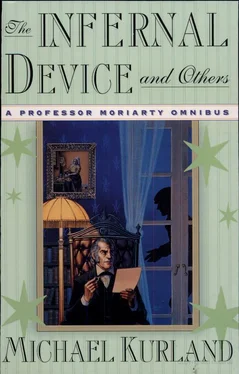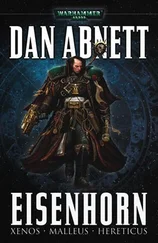"Lieutenant Sefton was a British agent — a spy. He evidently had some information about the destruction of the Garrett-Harris. He asked me to aid him and I agreed. I was to meet him in his room at midnight, and we would proceed to some undisclosed destination. I had the impression that it would be wise if I came prepared for trouble, so I brought my walking stick.
"When I arrived at the door to Sefton's room, it must have been almost midnight. I heard a scuffling sound from within. The door opened when I pushed at it, and I entered. Lieutenant Sefton was lying across the bed with a great wound in his skull. The window was wide open. There was nobody else in the room — or so I thought at the time.
"I rushed to the bed to aid Lieutenant Sefton, who was still alive, but barely. Suddenly someone struck me from behind, and I fell, unconscious, to the floor."
"You saw no one?"
"I neither saw nor heard anyone. Were it not for the evidence of the bump on the back of my head, I'd have no reason to believe that there was anyone else in that room."
"And then?"
"When I came around — it couldn't have been more than a few minutes later — the room was full of men. The night manager, the floor man, and several guests were all milling about, waiting for the police to arrive. It was the night manager, as a matter of fact, who brought me around by pouring the pitcher of water from the bureau over my head.
"I immediately tried to go to Lieutenant Sefton's aid. He was so far gone now that I couldn't tell whether he was still breathing, but nothing had been done to staunch the flow of blood from his head wound." Barnett lowered his head into his palm and began sobbing softly, this one dreadful memory overcoming his already fragile composure.
"Yes," Moriarty prompted. "And?"
"And they wouldn't let me!" Barnett said without looking up. "Those moronic — those incredible idiots wouldn't let me touch him. They thought that I'd struck him, you see. So they held me back when I attempted to go to him, and by the time a doctor arrived, he had bled to death!"
"How do you know Lieutenant Sefton was a spy?" Moriarty asked.
Barnett looked up. "What?"
"Lieutenant Sefton," Moriarty said. "You stated he was a spy. How do you know?"
"He told me so."
"Ah. Continue."
"When the police arrived they searched me. They found my walking stick on the floor, with blood on the ferrule, and they found several papers in my jacket pocket that appeared to be sections of the plans for the valving mechanism of the Garrett-Harris submersible."
"You, of course, have no idea how they got there."
"They weren't there when I left my room," Barnett insisted. "Whoever struck me on the head must have shoved the papers into my pocket; although why anyone would want to do such a thing is beyond me."
"The motives of men," Moriarty said, "are often quite beyond rational explanation. Although, in this case, the reason seems quite clear."
"Clear to you, maybe," Barnett said. "I've been beating my brains trying to figure it out for these past weeks."
" 'Beating your brains,' although a fascinating idiom, hardly seems a way to induce profitable ratiocination," Moriarty commented. "However, continue. You were accused of this crime?"
"This crime?" Barnett laughed hoarsely. "What you mean, Professor, is those crimes! I was accused of the crime of murdering Lieutenant Sefton and of the crime of being a spy. For good measure, what they'd also like to believe is that I blew up their precious submersible. That's what they've been trying to get me to admit when they question me, hour after hour, until I think I'm going mad."
"There you are," Moriarty said, shaking his head. "If you are not beating your own brain, you are having someone else do it for you."
"Look—" Barnett said.
"Now, now," Moriarty said, putting his hand on Barnett's shoulder. "I assure you I do take this seriously — very seriously, indeed. I am willing to help you — if you believe and understand that no one else can."
"What do you mean?" Barnett asked, staring at the professor.
"There was a trial?" Moriarty asked.
"You could call it that," Barnett said. "I wanted to wait until I could get legal help, but they weren't buying that. Three days after the murder I stood before a magistrate. I asked for the American minister to aid in my defense. An American counsel came as a spectator; the minister was otherwise engaged. I asked the World —my paper — to get me a lawyer. He hasn't shown up yet. Meanwhile, I was tried and convicted in something like three hours, and I've been here ever since."
"The trouble is, you see, that they also believe you to be guilty."
"You mean the American minister and my paper? How can they?"
"Why not? You were found alone in the room with Sefton. There were signs of a struggle. Obviously you fought over the plans, you struck him with your stick, and then he knocked you unconscious before falling back in a swoon on the bed. After all, the plans were in your pocket."
"But the open window?"
"It was inspected by the police. Nobody leaped to the ground— or at least, there were no marks."
"But what would I want with the plans?"
Moriarty shrugged. "What do spies ever want with the plans, or the papers, or the treaties, or whatever they steal? In any case, that's of no concern to the police."
"So you think my people are not going to help me?" Barnett asked.
"Your people are going to forget about you as rapidly as is decently possible."
"But you believe me innocent?" Barnett asked. "And you are willing to help me?" He shook his head and stared at the wall. "How can you help me? How can anyone help me?"
"I know you to be innocent, as it happens," Moriarty said. "And I can help you."
"How?" Barnett asked.
"First you must realize that I am your last hope," Moriarty said. "And then you must agree to my terms."
"Terms?"
"Correct."
"What is it that you want? No — first tell me how you know me to be innocent."
"As you may remember, when you saw me last I told you I was going to Odessa."
"Yes."
"While there I had access to some secret files of the Russian government — never mind how. What I read in the files, combined with some knowledge of my own, led me to the conclusion that you were not guilty of the murder of Lieutenant Sefton, the theft of the plans, or the destruction of the Garrett-Harris submersible."
"But then — you heard of all this in Odessa?"
"No, I heard of it quite by accident when I arrived back in Constantinople. But the chain was immediately clear to me."
"I see," Barnett said. "Well, then, couldn't you take this information to the proper authorities and convince them of my innocence? Or is that what you are proposing 'terms' for? You want to extract some promise from me in return for getting me released from this foul prison? Of course I'll agree to anything — but what assurance have you that I will fulfill the terms of our bargain once I get out? A promise issued under these conditions is not considered binding in any court of law west of the Suez."
"You misunderstand," Moriarty said. "I cannot get your conviction overturned by appealing to any authority. My conclusion is based on an assortment of random facts, connected only by my inference. No authority, east or west of Suez, is going to release a convicted felon because of a chain of inference concocted by a defrocked professor of mathematics. Besides, you must understand that the Osmanli authorities have a strong vested interest in seeing that you remain guilty of these crimes: they have already so informed Sultan Abd-ul Hamid, and one does not easily confess an error to the Shah of Shahs."
"Well then," Barnett said, "for my own piece of mind, tell me: What is your evidence?"
Читать дальше












